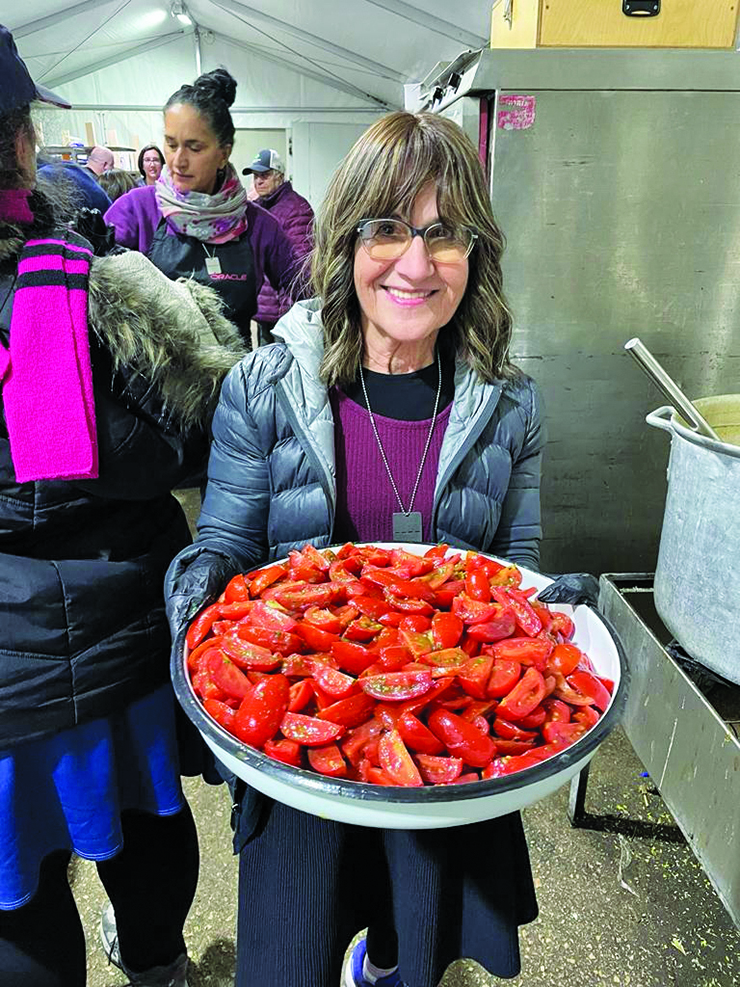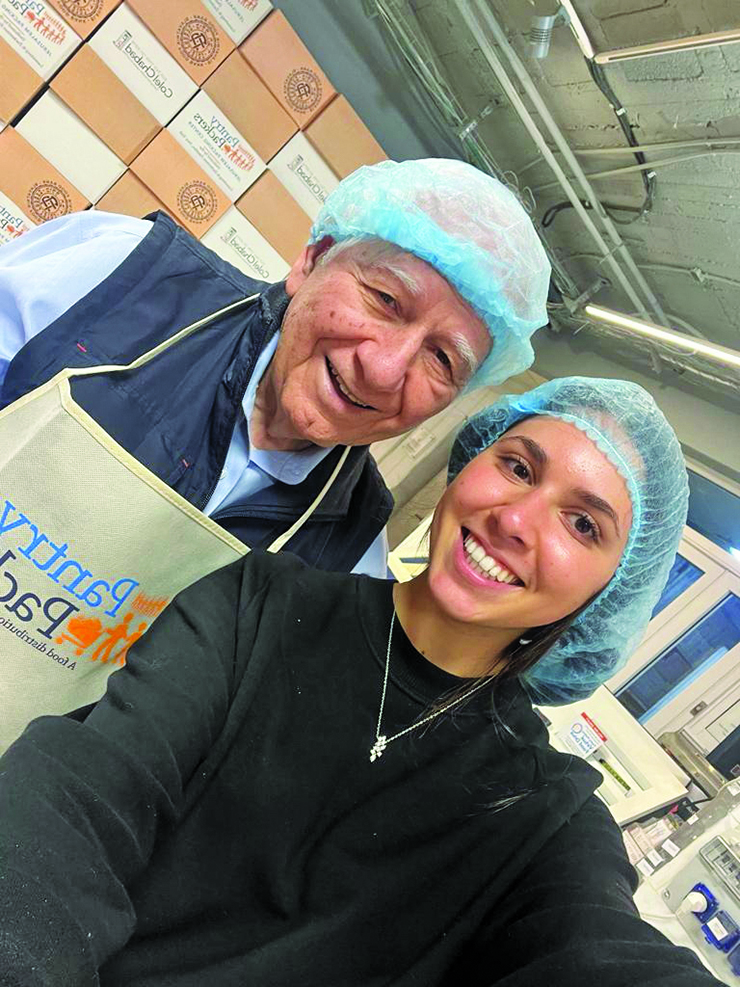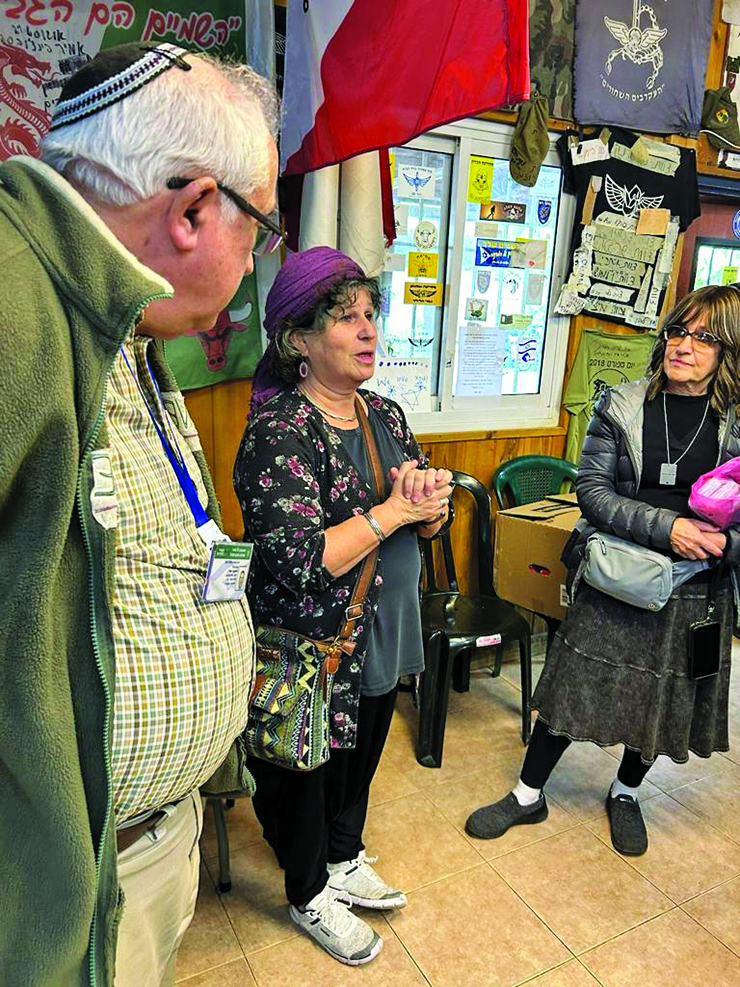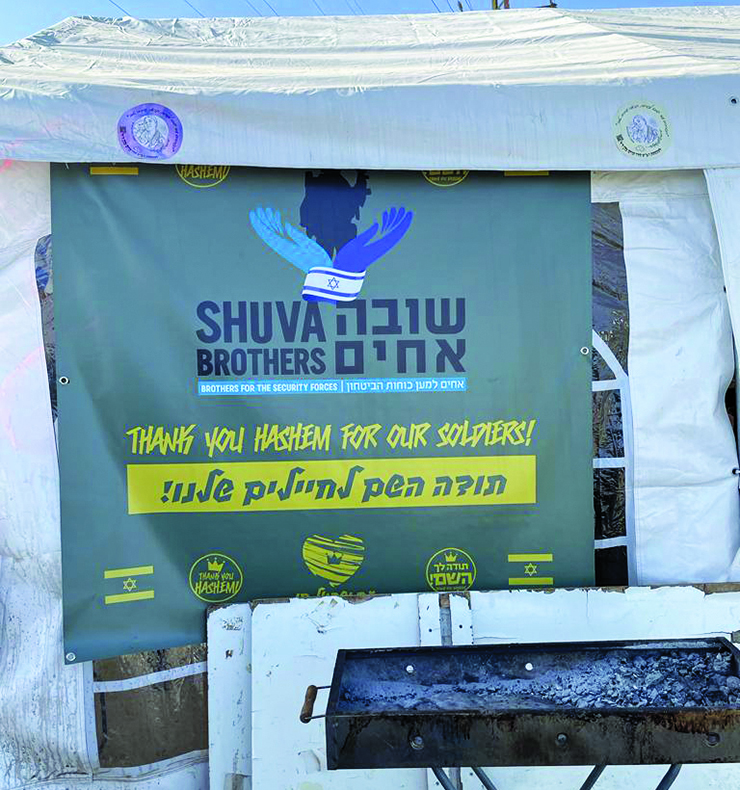
It was not the 20 degree temperatures that jolted me when I deplaned at Newark Airport on Sunday morning. I must admit that walking along the Yam in Netanya over Shabbat with the bright skies and 70 degree weather was rather amazing. Instead it was the idea that I was leaving the home of all of us. The place where everyone is trying to move on with their lives despite the amount of tragedy and uncertainty that dwells constantly in the minds of every single citizen.
Waking up this morning and hearing the tragic news—24 chayalim once again slaughtered by Hamas and imagining the amount of tears and sorrow demonstrated in so many different homes and families. One death affects so many and once again neighborhoods are bereft of people as en masse they are off to funeral after funeral. Frequently as we hit a traffic tie up during our trip it became obvious to our leaders that a levaya was in session somewhere and people were driving either to or from it.. When will this end? No one expects it to happen quickly.

When I decided to lead this mission it was the sole intent that our group let people know that we care about them, that they are not forgotten and that we will support them in any way possible.
Each day from morning till night we traversed the country seeing the most unbelievable resiliency and observing in disbelief what type of terror many are living through.
Upon checking into our hotel in Jerusalem we were informed that many from the northern border community of Shlomi would be our new neighbors. Families composed of grandparents, parents and children are now living in hotel rooms with their children having full rein of the lobby. The hotel has given them most of the mezzanine level for activities and constant volunteers are visiting to tutor, play, sing, prepare activities with all of the children. One mother related to me that her son is now in his third school in Yerushalayim as he is so unhappy that none of his friends are around. All are anxious to return to Shlomi and do not doubt that they will eventually be able to do so. After several rockets landed on open land close to their homes the decision was made to evacuate them all. Prior to leaving from Newark, I ravaged the shelves of the Dollar Tree on Teaneck Road taking every type of toy, card game, puzzles and tons of candy with the intention of distributing them to the children. Interestingly each time I attempted to give a child a package of candy (cotton candy) they immediately took it to their mother’s who interrogated me about what the hechsher was. I showed them the OU but most were unfamiliar with it. I tried to explain to them by nearly pulling my sheitel off my head that I was religious and that I was, in actual fact, a rabbanit and finally after several inquiries, the candy was kosher enough for their children. It actually impressed me that the children were so careful.
One of the women from the group owns a shoe store in Shlomi and asked me if I could help her. She is concerned by the displaced in Tiberias. They have all been moved to hotels and as a result there are no tourists in Tiberias to offer aid to them. She would like to send shoes from her store in Shlomi to the children of the displaced in Tiberias and asked if I can publicize her information. Anyone who is interested please contact me at the Link.

Each day of our mission we were up nice and early and off to many different destinations. I must publicly apologize to our wonderful group that on the morning we were supposed to be on our bus at 7:30 a.m., I suddenly awoke at 7:40.
What kind of a leader am I? (An exhausted one). Thank you Ilana for bringing breakfast onto the bus for me.
That day was the one in which we headed to the South to visit Be’eri, Sderot and the scene of the Nova music festival where so many were killed and taken hostage. Along any highway in Israel are sign after sign reading Am Yisrael Chai or Bring the Hostages Home. Driving through Be’eri and seeing the homes riddled with bullets or blown apart, the toys strewn upon the ground everywhere, the dogs ambling through the area, the total destruction of an entire town is an image that I do not think that any of us will ever forget. Approaching the Nova site, several feet away from where it took place is a large yard with tons of destroyed cars and vehicles, bombed out, burned out one on top of each other. What I found most poignant about this site was that on every vehicle, as I said, one on top of each other, was a pink sticker from Zaka ensuring that the vehicle had been checked and cleaned of blood, human parts, etc.

Right outside of the Nova site as well is a memorial that has been erected with a field of poles each one having a picture of a hostage who is missing or a person that has died at the site. Solemnly people walk along the field stopping upon recognizing a particular person or just looking at each one with pain. Our security person, Binyamin, a lone soldier from France found a picture of his friend that had left France together with him to serve in the IDF and was now known to be dead. Heart-wrenching is not a strong enough word. Many were overcome enough when Menachem White, a participant in our group chanted Kal Malae Rachamim on the grounds of the site.
Following our visit to both of these painful sites we were off to Sderot. Another town riddled by bullets and rockets. We visited the command center, attempted to fit into a shelter, and listened carefully as the events of the past few months were explained to us. Many in the yeshiva have remained with its doors open.
One of the greatest issues with the shelters was that after people entered, in many cases bodies lying on the floor with others on top of them in order to allow the greatest number of people into them, there was no lock on the doors of the shelter. We heard this time and time again. Shelters did not have locks on their doors. The same was mentioned in Be’eri and other towns where people rushed into their safe rooms but then realized that they had to hold tightly onto the door as it did not have a lock on it. In many cases their strength gave out, allowing horrific results.
From the horror of it all we drove to Shufa which is very close to Gaza where the chayalim once released from duty come across the border. Keep in mind that wherever you go, you are a few feet away from enemy territory. Describing “Shuva Ahim” (return of brothers), which was established by three brothers, is to explain what a mirage must look to soldiers suddenly being thrust into freedom.
Three brothers devastated by the attacks in the South decided to do all that they could to support the country in time of need. Kobi, Eliran and Dror left their jobs and most of their lives to dedicate themselves to supporting the country in need.
“Shuva Ahim” now offers a wide range of amenities, including clothing, toiletries, food rations and drinks, all available around the clock. The Trabelsi brothers, with the help of their mother and other volunteers, prepare and serve approximately 2,000 meals a day to soldiers in need. What began as a small table for coffee has now become a large storage tent filled with essential items generously donated by the community.
There is nothing that is missing from this amazing establishment. I happened to walk into a small room in the enclave and there was a chayal lying on a bed having a massage. I was totally shocked. 24 hours a day soldiers are filtering in for their first relief of some sort of normalcy. Food trucks, clothing, whatever necessary is waiting for them. I was most moved by watching as several chayalim came into the area and suddenly noticed a friend, brother, relative and watched them hug each other with tears and excitement. Only in Israel.
Of course they too need support from anyone who is able to give.We all felt compelled to donate to this very important incentive but I have to emphasize that no where that we visited were we asked directly to give money. The need everywhere is great and each cause is meaningful and important.

I think that I will leave other days of our trip to another issue of the Link but I am happy to share with everyone some of the comments from our participants. We were a great group and as I have mentioned in the past I am most grateful to each and every one of the members for being as concerned about their fellow brothers and sisters in Israel and taking the time from their busy schedules to partake. Note that this was not a vacation for anyone. This was a mission in which we accomplished much. Our concern for all Israeli’s was noted by many.
Our leader Peter Abelow is absolutely the best and each one of us will be forever grateful for his insight, his wisdom and the way that he prepared our entire itinerary was outstanding.
Comments from participants:
Menachem White:
“A great yasher koach to Nina and Peter and to the whole group. This was a unique and wonderful experience: so much accomplished in just six days.
It was particularly important to be able to interact with the evacuees from the town of Shlomi with whom we shared the hotel. Such resolve, and conviction that they would return to their home! Their children were excited to receive the Handi Famm measuring tape toy that I distributed, and their mothers were happy to have their children receive an educational toy. Personally, I was moved by emotion when I was able to lead davening at Heichal Shlomo on my father’s yahrzeit, and when I recited the memorial prayer at the site of the October 7 slaughter of the music festival. As I was waiting at the airport for the body scan for security, the guard said to me in Hebrew ‘we very much appreciate what your group has done.’ A really meaningful trip!”
Marilyn Zeidel:
“For myself personally the trip was very rewarding. I am so happy that Hashem gave me the zechut of being in the best country in the world at a time when our Israeli family needs us so much—and we need them so much too! It was particularly special for me to be at my husband’s kever at Eretz Yachaim cemetery on his yahrzeit. I know that he is definitely a meilitz yosher for all of us. Special thanks to you, Nina. Your effervescent personality definitely enhanced our trip.”
Ilana Adams:
Events of day three; “It’s hard to put into words what we have witnessed today. I hope the pictures will do justice to this monumental experience. And if not, you must come here to bear witness yourself.
We started in Sderot. The first picture is the empty space where the police station once stood. When the terrorists entered the neighborhood, they drove straight to the police station and murdered 47 officers. While the terrorists were inside, and the IDF came and confirmed there were no living Israelis in there, they quickly bombed the station. It was a nes that all the terrorists were in there and the IDF came when they did. We were then taken to their control center where we watched in horror the video surveillance of the terrorists entering the town, hanging off their trucks with guns and masks. They shot a father in the street and drove away as the man’s four-year-old daughter slowly wandered up the block away from her dying father.”
Just a small reminder of what the Israelis had to live through. What has happened to that little girl?
Leah Mizrahi:
“Seeing the devastation in Kibbutz Be’eri and the city of Sderot was very difficult to take. To see the place where the music festival occurred and the pictures of the hostages and dead people made me cry. Listening to the stories of the speakers were sad and inspiring. Seeing and hearing from the chayalim and their good spirits about believing in their winning made me feel pride about the IDF and what they are going through for us and everyone else. I thought that the Pina Chama and Shuva were amazing.”












